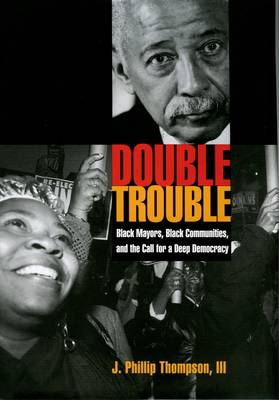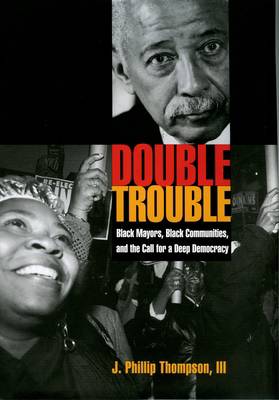
- Afhalen na 1 uur in een winkel met voorraad
- Gratis thuislevering in België vanaf € 30
- Ruim aanbod met 7 miljoen producten
- Afhalen na 1 uur in een winkel met voorraad
- Gratis thuislevering in België vanaf € 30
- Ruim aanbod met 7 miljoen producten
Zoeken
Double Trouble
Black Mayors, Black Communities, and the Call for a Deep Democracy
J Phillip Thompson
€ 140,95
+ 281 punten
Omschrijving
J. Phillip Thompson III, an insider in the Dinkins administration, provides the first in-depth look at how the black mayors of America's major cities achieve social change. Black constituents naturally look to black mayors to effect great change for the poor, but the reality of the situation is complicated. Thompson argues that African-American mayors, legislators, and political activists need to more effectively challenge opinions and public policies supported by the white public and encourage greater political inclusion and open political discourse within black communities. Only by unveiling painful internal oppresssions and exclusions within black politics will the black community's power increase, and compel similar unveilings in the broader interracial conversation about the problems of the urban poor. Tracing the historical development and contemporary practice of black mayoral politics, this is a fascinating study of the motivations of black politicians, competing ideologies in the black community and the inner dynamics of urban social change.
Specificaties
Betrokkenen
- Auteur(s):
- Uitgeverij:
Inhoud
- Aantal bladzijden:
- 360
- Taal:
- Engels
- Reeks:
Eigenschappen
- Productcode (EAN):
- 9780195177336
- Verschijningsdatum:
- 1/12/2005
- Uitvoering:
- Hardcover
- Formaat:
- Genaaid
- Afmetingen:
- 161 mm x 243 mm
- Gewicht:
- 657 g

Alleen bij Standaard Boekhandel
+ 281 punten op je klantenkaart van Standaard Boekhandel
Beoordelingen
We publiceren alleen reviews die voldoen aan de voorwaarden voor reviews. Bekijk onze voorwaarden voor reviews.











